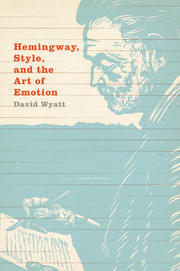Description
Hemingway, Style, and the Art of Emotion
Author: Wyatt David
This reassessment of Hemingway's career recovers the soul of his work, revealing him as a multifaceted writer rather than a static icon.
Language: EnglishApproximative price 31.58 €
In Print (Delivery period: 14 days).
Add to cart
Hemingway, Style, and the Art of Emotion
Publication date: 09-2017
Support: Print on demand
Publication date: 09-2017
Support: Print on demand
Approximative price 85.25 €
In Print (Delivery period: 14 days).
Add to cart
Hemingway, Style, and the Art of Emotion
Publication date: 09-2015
Support: Print on demand
Publication date: 09-2015
Support: Print on demand
Description
/li>Contents
/li>Biography
/li>
In Hemingway, Style, and the Art of Emotion, David Wyatt shows that the work of Ernest Hemingway is marked more by vulnerability and deep feeling than by the stoic composure and ironic remove for which it is widely known. This major reassessment of the shape of Hemingway's career recovers the soul of the author's work, revealing him as a multifaceted writer rather than a cold, static icon. Wyatt claims that Hemingway's famous early style does not embrace emotional reticence but works instead to measure the cost of keeping thoughts and feelings under the surface. By the early 1930s Hemingway also turned away from the art of 'the omitted' and began to develop a vision and style more accommodating of the awkwardness and embarrassments of everyday life. Relying on a thorough knowledge of the vast archive Hemingway left behind at his death, this book shows Hemingway as a thoroughly complex and transmutable figure.
1. At the beginning: 'Indian Camp'; 2. A second will: In our Time and in our time; 3. The end of pleasure: The Sun Also Rises; 4. False surmise: A Farewell to Arms; 5. Making a wound: A Farewell to Arms and 'Now I Lay Me'; 6. Awkwardness and appreciation: Death in the Afternoon; 7. Hunting shame: Green Hills of Africa; 8. Empathy and candor: 'The Short Happy Life of Francis Macomber'; 9. Taking time: For Whom the Bell Tolls; 10. Forgiveness: For Whom the Bell Tolls; 11. Befriending: The Old Man and the Sea; 12. Replacement and remorse: The Garden of Eden and A Moveable Feast; 13. How to end it: The Garden of Eden and A Moveable Feast.
David Wyatt is Professor of English at the University of Maryland, College Park, where he has been named a Distinguished Scholar-Teacher. His books include Prodigal Sons: A Study in Authorship and Authority (1980), The Fall into Eden: Landscape and Imagination in California (Cambridge, 1986), Out of the Sixties: Storytelling and the Vietnam Generation (Cambridge, 1993), and When America Turned: Reckoning with 1968 (2014). Wyatt's essays have appeared in American Literature, The Kenyon Review, The Hopkins Review and South Atlantic Quarterly.
© 2024 LAVOISIER S.A.S.
These books may interest you

Ernest Hemingway in Context 31.58 €

Ernest Hemingway in Context 137.61 €



